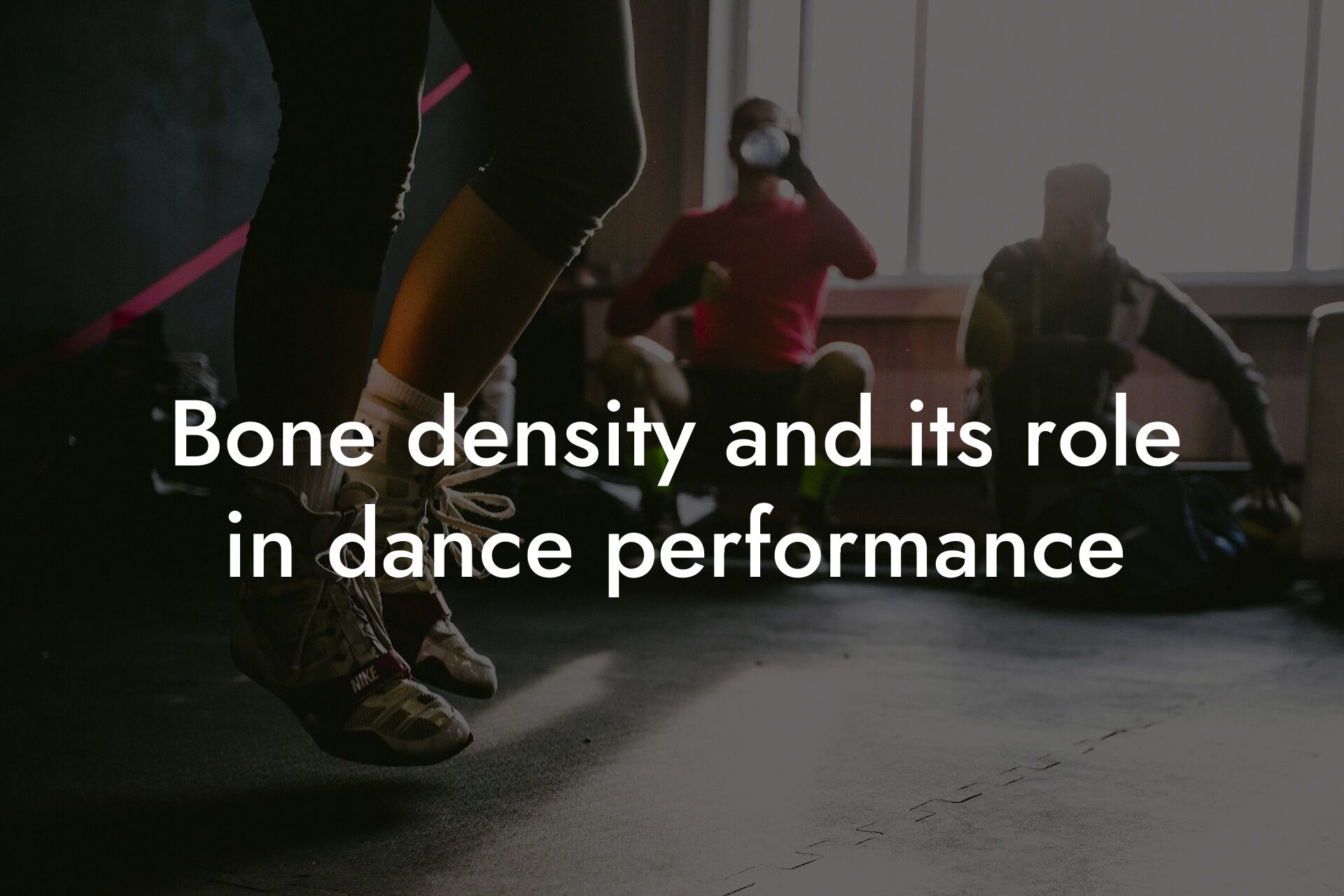As a dance fitness enthusiast, you understand the importance of maintaining a healthy and strong body. Whether you're a professional dancer or simply enjoy dancing as a form of exercise, it's essential to monitor your body's progress and make data-driven decisions to optimize your performance. This is where a DEXA (Dual-Energy X-ray Absorptiometry) scan comes in – a non-invasive, pain-free test that provides a comprehensive analysis of your body composition, bone density, and more.
Table of Contents
What Does a DEXA Scan Measure?
A DEXA scan uses X-ray technology to measure the density of your bones, as well as the composition of your body, including lean muscle mass, fat mass, and visceral fat. This information is then used to calculate your body fat percentage, lean body mass, and bone mineral density. The scan can also identify areas of fat distribution, such as visceral fat, which can be a risk factor for chronic diseases like diabetes and cardiovascular disease.
How Can DEXA Scans Benefit Dance Fitness Enthusiasts?
As a dance fitness enthusiast, a DEXA scan can provide valuable insights into your body's composition and help you optimize your performance. Here are some ways a DEXA scan can benefit you:
• Improved Body Composition: A DEXA scan helps you understand your body fat percentage, lean body mass, and fat distribution. This information can help you tailor your diet and exercise routine to achieve your desired body composition, whether that's building lean muscle or reducing body fat.
• Injury Prevention: DEXA scans can identify areas of low bone density, which can be a risk factor for injuries like stress fractures. By monitoring your bone density, you can take proactive steps to prevent injuries and maintain optimal bone health.
• Enhanced Performance: By understanding your body composition and bone density, you can optimize your dance training and nutrition to improve your overall performance. This can lead to increased strength, power, and endurance, helping you take your dance fitness to the next level.
• Personalized Nutrition and Training: A DEXA scan provides valuable insights into your body's specific needs, allowing you to create a personalized nutrition and training plan tailored to your goals and body composition.
What to Expect During a DEXA Scan
A DEXA scan is a quick and painless procedure that typically takes around 10-15 minutes to complete. Here's what you can expect during the scan:
• You'll lie down on a flat, padded table, and a technician will position your body to ensure accurate readings.
• The DEXA machine will pass over your body, emitting a low-level X-ray beam that measures the density of your bones and body composition.
• You'll be asked to hold still and breathe normally during the scan.
• The technician will then analyze the data and provide you with a detailed report outlining your body composition, bone density, and other key metrics.
How Often Should I Get a DEXA Scan?
The frequency of DEXA scans depends on your individual goals and needs. Here are some general guidelines:
• If you're a beginner, it's recommended to get a baseline DEXA scan to establish a starting point for your fitness journey.
• If you're an experienced dancer or athlete, you may want to get a DEXA scan every 6-12 months to monitor your progress and make adjustments to your training and nutrition plan.
• If you have specific goals, such as reducing body fat or increasing lean muscle mass, you may want to get a DEXA scan more frequently (every 3-6 months) to track your progress.
What to Look for in a DEXA Scan Report
A DEXA scan report provides a wealth of information about your body composition and bone density. Here are some key metrics to look for:
• Body Fat Percentage: This measures the percentage of your body composed of fat. A lower body fat percentage is generally associated with better overall health and athletic performance.
• Lean Body Mass: This measures the amount of lean muscle mass in your body. A higher lean body mass is associated with increased strength, power, and endurance.
• Bone Mineral Density (BMD): This measures the density of your bones. A higher BMD is associated with stronger bones and a reduced risk of osteoporosis and fractures.
• Visceral Fat: This measures the amount of fat stored around your internal organs. Excess visceral fat is associated with an increased risk of chronic diseases like diabetes and cardiovascular disease.
In conclusion, a DEXA scan is a valuable tool for dance fitness enthusiasts looking to optimize their performance and achieve their goals. By providing a comprehensive analysis of your body composition and bone density, a DEXA scan can help you make data-driven decisions about your training and nutrition plan. Whether you're a professional dancer or simply enjoy dancing as a form of exercise, a DEXA scan can help you take your fitness to the next level.
At Tano Performance Group, we understand the importance of monitoring your body's progress and making informed decisions about your fitness journey. That's why we offer comprehensive DEXA scans as part of our suite of services. Contact us today to learn more about how a DEXA scan can benefit you and take your dance fitness to new heights.
Frequently Asked Questions
What is a DEXA scan and how does it work?
A DEXA (Dual-Energy X-ray Absorptiometry) scan is a non-invasive, painless medical test that measures bone density, body composition, and fat distribution. It uses X-rays to produce images of the body's internal structures, which are then analyzed to provide detailed information about bone density, lean mass, and fat mass.
Why do dance fitness enthusiasts need DEXA scans?
Dance fitness enthusiasts, especially those who engage in high-impact activities, are at a higher risk of developing osteoporosis, stress fractures, and other bone-related injuries. DEXA scans help identify these risks early on, allowing individuals to take preventative measures to protect their bones and optimize their performance.
What can I expect during a DEXA scan?
During a DEXA scan, you will lie down on a table, and a scanner will pass over your body, taking X-ray images of your bones and body composition. The entire process typically takes around 10-15 minutes, and you will be asked to remain still and hold your breath for a few seconds during the scan.
Is a DEXA scan safe?
Yes, DEXA scans are extremely safe and use very low levels of radiation, equivalent to a few days of natural background radiation. They are also non-invasive, painless, and do not require any injections or contrast agents.
How often should I get a DEXA scan?
The frequency of DEXA scans depends on your individual needs and goals. For dance fitness enthusiasts, it's recommended to get a scan every 6-12 months to track changes in bone density and body composition. However, if you have a history of bone-related injuries or concerns, your healthcare provider may recommend more frequent scans.
What information does a DEXA scan provide?
A DEXA scan provides detailed information about your bone density, lean mass, fat mass, and body fat percentage. It also provides a visceral fat rating, which measures the amount of fat around your organs, and a bone mineral density (BMD) score, which compares your bone density to that of a healthy adult.
How does a DEXA scan help with weight management?
A DEXA scan helps with weight management by providing a detailed breakdown of your body composition, including lean mass, fat mass, and body fat percentage. This information allows you to tailor your diet and exercise routine to achieve your weight loss or maintenance goals.
Can a DEXA scan help with injury prevention?
Yes, a DEXA scan can help with injury prevention by identifying areas of low bone density, which can increase the risk of fractures and other bone-related injuries. By addressing these areas, you can take preventative measures to reduce your risk of injury and optimize your performance.
How does a DEXA scan benefit dance fitness enthusiasts specifically?
A DEXA scan benefits dance fitness enthusiasts by providing valuable insights into their bone density, body composition, and fat distribution. This information can help them optimize their training, reduce their risk of injury, and improve their overall performance.
Can a DEXA scan help with athletic performance?
Yes, a DEXA scan can help with athletic performance by providing information about your lean mass, which is a key indicator of muscle mass and strength. This information can help you optimize your training and nutrition to improve your athletic performance.
Is a DEXA scan only for athletes?
No, a DEXA scan is not only for athletes. Anyone who is interested in tracking their bone density, body composition, and fat distribution can benefit from a DEXA scan, regardless of their fitness level or athletic background.
How long does it take to get the results of a DEXA scan?
The results of a DEXA scan are typically available within 24-48 hours after the scan. Your healthcare provider will review the results with you and provide personalized recommendations based on your scan.
Can I get a DEXA scan if I'm pregnant or breastfeeding?
It's generally recommended to avoid DEXA scans during pregnancy and breastfeeding, as the radiation exposure, although low, may pose a risk to the fetus or baby. However, if you have a medical condition that requires a DEXA scan, your healthcare provider will weigh the benefits and risks and make a recommendation.
How much does a DEXA scan cost?
The cost of a DEXA scan varies depending on the location, healthcare provider, and insurance coverage. On average, the cost of a DEXA scan ranges from $100 to $300. However, if you have insurance, your out-of-pocket cost may be significantly lower or even covered entirely.
Is a DEXA scan covered by insurance?
Insurance coverage for DEXA scans varies depending on the provider and policy. Some insurance plans may cover DEXA scans for certain medical conditions, such as osteoporosis, while others may not. It's best to check with your insurance provider to determine your coverage.
What are the benefits of getting a DEXA scan at Tano Performance Group?
At Tano Performance Group, our team of experts will provide you with a comprehensive analysis of your DEXA scan results, along with personalized recommendations to help you achieve your fitness and wellness goals. Our state-of-the-art facility and advanced technology ensure accurate and reliable results.
How do I prepare for a DEXA scan?
To prepare for a DEXA scan, avoid eating or drinking for at least 2 hours prior to the scan, and wear loose, comfortable clothing without metal fasteners or zippers. You should also avoid taking calcium supplements or medications that contain metal for 24 hours before the scan.
What if I have a history of bone-related injuries or conditions?
If you have a history of bone-related injuries or conditions, such as osteoporosis, stress fractures, or osteopenia, it's essential to discuss your medical history with your healthcare provider before getting a DEXA scan. They will provide personalized guidance and recommendations based on your individual needs.
Can I get a DEXA scan if I have a pacemaker or other implantable device?
It's generally recommended to avoid DEXA scans if you have a pacemaker or other implantable device, as the strong magnetic fields used in the scan may interfere with the device. However, if you have a medical condition that requires a DEXA scan, your healthcare provider will weigh the benefits and risks and make a recommendation.
How does a DEXA scan compare to other body composition tests?
A DEXA scan is considered the gold standard for measuring bone density and body composition. It is more accurate than other tests, such as bioelectrical impedance analysis (BIA) or skinfold measurements, and provides more detailed information about your body composition and fat distribution.
Can I get a DEXA scan if I'm under 18 years old?
DEXA scans are typically recommended for individuals over 18 years old. However, if you're under 18 and have a medical condition that requires a DEXA scan, your healthcare provider will discuss the risks and benefits with you and your parents or guardians.
How does a DEXA scan help with overall health and wellness?
A DEXA scan provides valuable insights into your overall health and wellness by measuring bone density, body composition, and fat distribution. This information can help you identify areas for improvement and make informed decisions about your diet, exercise, and lifestyle choices.
Here are some related articles you might love...
- Nutrition tips for sustained energy in dance classes
- Recovery techniques for dancers after intense sessions
- Bone density and its role in dance performance
- The impact of body composition on dance fitness performance
- Balancing strength, flexibility, and grace in dance fitness
- Reducing body fat for improved flexibility and agility in dance
- The role of dance in cardiovascular health
- Maintaining muscle tone and endurance in dance fitness
- Strength training tips to complement your dance fitness routine
Zak Faulkner
Zak Faulkner is a leading authority in the realm of physical health and body composition analysis, with over 15 years of experience helping professionals optimise their fitness and well-being. As one the experts behind Tano Performance Group, Zak has dedicated his career to providing in-depth, science-backed insights that empower clients to elevate their physical performance and overall health.
With extensive knowledge of DEXA technology, Zak specializes in delivering comprehensive body assessments that offer precise data on body fat, muscle mass, bone density, and overall physique. His expertise enables individuals to make informed decisions and achieve their fitness goals with accuracy and confidence. Zak’s approach is rooted in a deep understanding of human physiology, combined with a passion for helping clients unlock their full potential through personalised strategies.
Over the years, Zak has earned a reputation for his commitment to excellence, precision, and client-focused service. His guidance is trusted by top professionals who demand the best when it comes to their health. Whether advising on fitness programs, nutritional strategies, or long-term wellness plans, Zak Faulkner’s insights are a valuable resource for anyone serious about taking their health and fitness to the next level.
At Tano Performance Group, Zak continues to lead our Content Team revolutionising how professionals approach their physical health, offering unparalleled expertise that drives real results.




